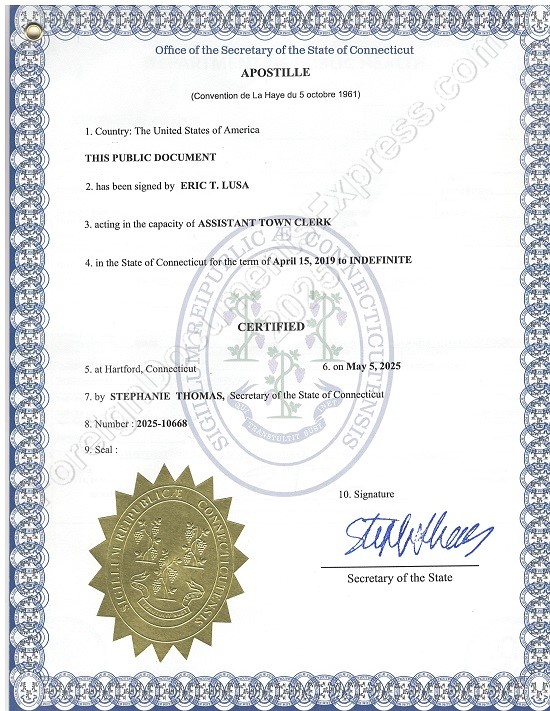Notary apostille in Connecticut

What agency issues apostilles, and what do you need to check before you present your notarized document for authentication by a Connecticut apostille?
What do you need to check before you present your notarized document for a Connecticut apostille?
1. That the Notary Public has signed his/her name exactly as he/she was commissioned (as the name appears of the Certificate of appointment and the notary seal).
2. That the notarial certificate has been completed properly (see below).
3. That the Notary Public’s expiration date is on the document correctly, clearly and completely.
Sample notarial certificates in the State of Connecticut
![]() Acknowledgment:
Acknowledgment:
An acknowledgment is the most common notarial act that a notary will be called upon to perform. It is a formal declaration before an authorized official by a person who executed an instrument that such instrument is his/her free act and deed. The usual acknowledgment form states that the signer of the instrument personally appeared before the notary and acknowledged having signed the instrument for its stated purpose. For an acknowledgment to beproperly taken, each of the following requirements must be fulfilled. The signer must: (1) personally appear before the notary; (2) acknowledge that s/he signed the instrument in question; and (3) state that it is his/her free act and deed.
Here is a sample CT acknowledgment form for individual:
Here is a sample CT acknowledgment form for corporation:
![]()
Jurat:
Oaths and Affirmations must be given in person. An oath is an affirmation of the truth of a statement, which renders any person who willfully makes untrue statements subject to the penalties for perjury or false statement. The notary administers an oath to the party making the affidavit. The party then signs the affidavit in the presence of the notary. The notary then attaches the following certificate, which is commonly called a jurat, to the affidavit:
![]()
Copy certification:
Under Connecticut law, notaries have the authority to prepare “certified” or “true” copies of certain documents. For copy certification, a notary public is presented with an original document and: (1) copies or supervises the copying of such document using a photographic or electronic copying process; (2) compares the original document presented to the copy; and (3) certifies that the copy is an accurate and complete reproduction of the original work presented. However, there are exceptions to this law that include: (1) the copying of a vital or public record (certificate of birth, death, fetal death, or marriage); (2) a document required to be recorded by a state or political subdivision; or (3) a document issued by a federal agency and federal law does not allow the copying of the document.
The notary may also request that the person presenting the document make a photocopy and prepare a written statement, that may beattached to or written on the photocopy itself, stating that it is a true copy of the original. The requesting party signs the statement in the notary’s presence. Then a jurat is completed by the notary.
![]() Connecticut state law does not require that notaries obtain and use a seal or rubber stamp. Even though the use of a seal is optional, state law does prescribe the format of the seal to be used. The notary seal must include the notary's name as it appears on the certificate of appointment, the words "Notary Public" and "Connecticut". State law does give the notary the option of having the words "My Commission Expires (commission expiration date)" appear on the seal. However, most notaries find that it is more practical to have their commission expiration date appear on a separate rubber stamp along with their name and title. When using the seal, the impression should be affixed near, but not over, the notary's signature. The stamp bearing the words "My Commission Expires" should be placed below the notary's signature, and the notary must write in the date on which their commission expires,unless the date appears on the stamp.
Connecticut state law does not require that notaries obtain and use a seal or rubber stamp. Even though the use of a seal is optional, state law does prescribe the format of the seal to be used. The notary seal must include the notary's name as it appears on the certificate of appointment, the words "Notary Public" and "Connecticut". State law does give the notary the option of having the words "My Commission Expires (commission expiration date)" appear on the seal. However, most notaries find that it is more practical to have their commission expiration date appear on a separate rubber stamp along with their name and title. When using the seal, the impression should be affixed near, but not over, the notary's signature. The stamp bearing the words "My Commission Expires" should be placed below the notary's signature, and the notary must write in the date on which their commission expires,unless the date appears on the stamp.
Starting in 2025, Connecticut apostilles feature a new design: a blue border composed of small Connecticut seals.
In the State of Connecticut, as in all U.S. states, an apostille is a separate page attached to the document by an eyelet in the upper left corner. It is signed by the Secretary of State (facsimile signature) and has the Seal of the State of Connecticut.
![]() Connecticut apostille: $175
Connecticut apostille: $175
Processing time: app. 2 weeks + mail
![]() Please complete the Order Form and mail it with your original document(s) to
Please complete the Order Form and mail it with your original document(s) to
If you are sending your document(s) from a foreign country, please use FedEx, DHL, UPS or TNT, and email the tracking number so that we can watch for your package.
 No hidden fees.
No hidden fees.
Our guarantee: If we are unable to get your documents apostilled or legalized, we will issue a 100% refund, we do not keep any service fees.
Free document evaluation
Want to double check before shipping your document? Email a copy for a free evaluation.

